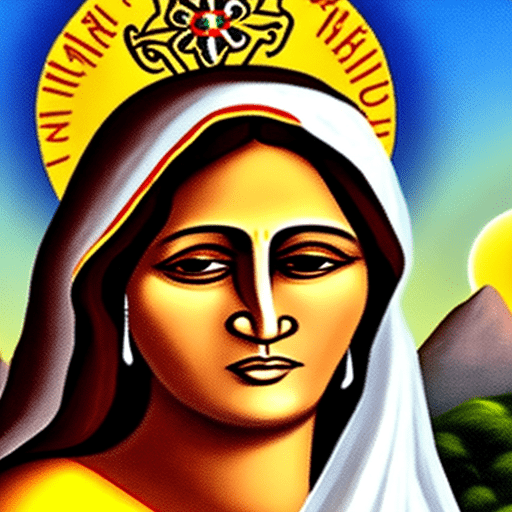In revered religious belief, the title “Maria mãe de Deus,” translated from Portuguese as “Mary Mother of God,” encapsulates the profound reverence and veneration that many devotees hold for the figure of Mary, seeing her as possessing the immense privilege and honor of being chosen as the mother of Jesus, who is considered in Christian theology as the son of God. This title symbolizes the unique and central role that Mary plays in the faith and devotion of millions worldwide, representing the epitome of divine maternal love and compassion. Throughout history, Mary’s significance as the mother of Jesus has transcended mere biological maternity to encompass a deeper spiritual dimension, portraying her as a compassionate intercessor and a symbol of hope and grace for believers across cultural and religious boundaries.”Maria mãe de Deus” enriches the devotional imagery associated with Mary, portraying her not only as a maternal figure but also as a bridge between humanity and the divine, signifying her pivotal position in facilitating the manifestation of God’s love and mercy among humankind. This timeless epithet reaffirms Mary’s status as a central figure in Christianity, evoking a deeply emotional and spiritual response among those who revere her, and highlighting her perpetually enduring influence as a beacon of faith for countless individuals navigating the complexities of life and faith. In theological discourse and artistic representations alike, “Maria mãe de Deus” serves as a powerful testament to Mary’s exalted significance within the faith community and invites believers to deepen their connection to her through prayer, meditation, and reflection on her exemplary qualities as a model of faith and devotion.”
Beyond doctrinal implications, the phrase “Maria mãe de Deus” encapsulates the intertwining of maternal instincts and divine calling within the character of Mary, underscoring her substantial role not only in the narratives of Christianity but also in the broader cultural and spiritual imagination of countless people worldwide throughout history. Meditating on the title “Maria mãe de Deus” invites contemplation on the paradoxical nature of Mary’s identity as both a figure steeped in human emotions and experiences and as a conduit for the transcendent grace and compassion of the divine. Throughout centuries of reverence and artistic expression, Mary, as “Maria mãe de Deus,” has been hailed as a source of solace, strength, and inspiration for those seeking comfort amidst life’s trials and a palpable connection to the unconditional love and acceptance symbolized by the divine in the form of her son, Jesus Christ.
Embracing the multifaceted layers of meaning evoked by the appellation “Maria mãe de Deus” can lead believers on a profound journey of spiritual discovery, inviting introspection on the divine feminine aspects of the sacred that are embodied by Mary as a central embodiment of maternal care within the Christian tradition. By contemplating Mary’s title in the Portuguese form “Maria mãe de Deus,” individuals may deepen their understanding of the significance of her role in the spiritual universe’s pantheon, striving to emulate her virtues of compassion, humility, and unwavering faith as a means of drawing closer to the divine presence she represents in her sacred maternity over time and generations.







